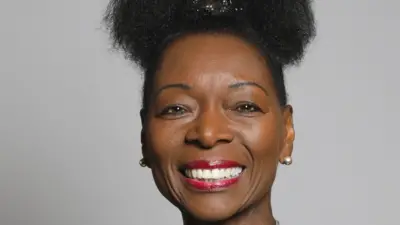We've updated our Privacy and Cookies Policy
We've made some important changes to our Privacy and Cookies Policy and we want you to know what this means for you and your data.
After Life: Third series is a hit with viewers, but less so with critics
Image source, Netflix
Mixed reviews have not deterred the third series of After Life from reaching number one on Netflix.
The final season of the hugely popular Ricky Gervais comedy was warmly welcomed by fans over the weekend, but many critics were harder to win over.
In a one-star review, Chris Bennion of The Telegraph called it a "trite, mawkish, soggy pudding of a series".
NME's James McMahon, however, said the show was "going out on a high" in his four-star review.
The third series of after life currently has a healthy 76% audience score on reviews aggregator Rotten Tomatoes, but only 33% average score from critics.
The series, which began in 2019, follows Tony Johnson (played Gervais) as he attempts to come to terms with the death of his wife from cancer.
Image source, Netflix
In his grief, Tony is nasty to many people around him and seemingly uncaring about the consequences of his actions and words.
The series follows him as he grapples with his emotions and finds glimmers of hope from within his own life.
But many critics, who have generally welcomed previous seasons of the show, were disappointed by the six episodes of series three.
"Fans hoping for a satisfying, neat ending will be disappointed," wrote Emily Baker of the i paper. "Not because questions are left unanswered, but because the questions have been abandoned altogether.
"Gervais's intentions are good, and I admit I shed a few tears, but the almost evangelical proclamations of living life to the fullest were manipulative. Can a TV show that inspires emotion really be that bad? (Spoiler: yes)."
She awarded the series two stars, concluding: "It's the right time for After Life to be laid to rest and even though he has said he was unsure about the decision to end the show, Gervais must know there was nowhere else for it to go."
Abby Robinson of the Radio Times said: "The very act of mourning is heavy and monotonous, and Gervais refuses to sugarcoat that, instead leaning into its permanence.
"As a result, After Life has become something of an endurance test, and even Penelope Wilton (Anne) isn't able to lift us with her character's more hopeful dialogue.
"That being said, it's a given that the swathes of people who have followed the series from the very beginning (100 million households, according to Netflix) will relish the show's final chapter. They are simply happy to spend time in that bubble, enjoying the many faces and their respective idiosyncrasies."
Image source, Netflix
Netflix subscribers sent the third series of After Life to the top of its streaming chart over the weekend, in spite of some poor reviews.
"Gervais is better than this," wrote Barbara Ellen in The Guardian. "I loved it when he used to host the Golden Globes, genuinely alarming the A-list audience.
"Here, the finale, with superb use of Joni Mitchell's Both Sides Now, shows imagination and spirit. Otherwise, I remain unconvinced by After Life's exploration of grief. For me, there's a blatant prodding of buttons; the sense of a cue card reading: 'Audience, cry now!' It's time for After Life to slip gently away."
In what was perhaps the most negative review, The Telegraph's Chris Bennion said the show "wallows in its own cynical slurry pit of emotion and thin-skinned misanthropy".
"This is not to say that After Life does not work on some levels," he acknowledged. "It's designed as a feelgood tearjerker, and as it reaches its denouement the emotional beats are punched harder and harder, and the indie-song soundtrack gets sadder and sadder.
"Hardcore fans of the show - which are legion - will mourn its passing, but for the rest of us, Gervais's maudlin curio remains a kind of purgatory."
Image source, Getty Images
There was a much more enthusiasm from NME's James McMahon, who awarded the series four stars.
"Unapologetically nasty, saccharine, lovely and poignant," he said of the series. "It's also often a bit of a mess, a little bit like life itself.
"[Tony] is often mean, a bit prejudiced, arrogant, he thinks he's right about everything, the self-absorbed master of his own universe. And yet when the character achieves a genuine realisation - that life is brief and fragile, but worth having a good go at - it's all the more powerful for being so."
Metro's Charlotte Manning was similarly positive, also awarding the series four stars while saying the show had been brought to a "natural, yet poignant end".
"Of the core cast, Diane Morgan particularly excels as Kath. She offers further brilliantly cringe moments through a series of awful dates - and her sadness after they fail to go well," Manning wrote.
"In the Love Actually-esque style finale, Tony realises love, actually is all around him (including from Brandy the dog, who we promise is fine) and there are ultimately many glimmers of hope for the future and reasons to stay put at last."
Some critics drew comparisons with other shows which are popular with viewers but not always well-received by critics, such as the BBC's Mrs Brown's Boys.
"Ricky Gervais's After Life is a conundrum, noted Hugo Rifkind of The Times. "Viewers love it and critics can't figure out why at all.
Image source, Netflix
"Treated with a little more care, I suppose all of this could be saying really interesting things about male failure and loneliness. It's lazy, though. No idea or message is ever pursued. Nothing is.
"The jokes, though, aren't really the point of After Life, and I'm sure they're not why it's so beloved either. Some of them, frankly, are incongruous, with Gervais just standing in the middle of the street, swearing at people. No, the point is the sentiment, which goes all the way to mawkish."
There was agreement from Louis Chilton in The Independent., who said: "If you're not already on board with Gervais's shtick then this is unlikely to convert you - anyone looking for the usual mix of pseudo-ironic homophobia, fatphobia and sexism won't walk away empty-handed - but it's undeniably better than the serious parts of the script.
"Monologues about grief and recovery are painfully trite, painfully single-dimensional; it falls short of even syrupy fare like [Apple TV comedy] Ted Lasso.
"Ultimately, there are little things that endear you to After Life - among them a great soundtrack, a cast of characters who don't all look like conventional TV stars, a standout performance from Morgan and a brilliant cameo from Tim Key. But then it's all undone by a descent into clumsy sentimentalism."
Top Stories
Features & Analysis
Most read
Content is not available








